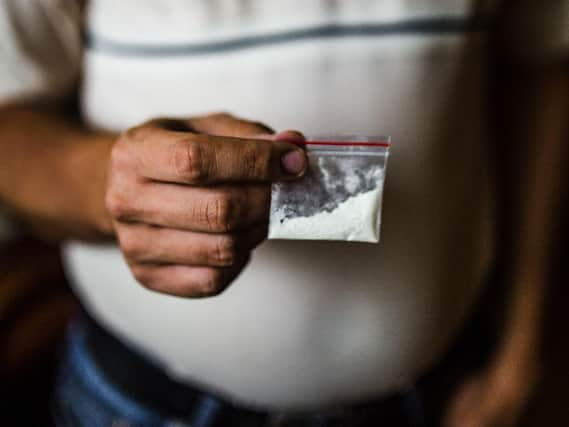Scotland should see the UK government in court and forge ahead with bold drugs policy - Michael Collins


In April, First Minister Nicola Sturgeon confessed the SNP had taken its “eye off the ball” when it came to drug deaths. The admission was stunning for two reasons. Firstly, politicians rarely admit they have made a mistake. Secondly, it spoke to the fact that SNP leadership had never prioritised the drug crisis. If we are to believe that Sturgeon’s eye is now on the ball, then the country needs to allow her renewed focus to take effect.
For example, in January, the SNP committed an extra £250m over five years to tackling overdoses, with more money going to
Advertisement
Hide AdAdvertisement
Hide Adtreatment facilities and naloxone. Patience is understandably in short supply given the magnitude of the crisis, but Scotland’s death figures will not simply be reversed in a matter of months.


Good policy changes are systemic, and systemic change takes time. Persistence with this approach is essential.
There is a danger that with the election in the rear-view mirror, and Covid-19 and independence hogging the headlines, overdose deaths will become a second-tier issue for the SNP. The publication of quarterly overdose data should help the issue remain in the news and Sturgeon must know that despite her refreshing “eye off the ball” candour, she will soon max out on mea culpas. The public should therefore persist in holding Sturgeon accountable on this topic.
The Scottish government should also push for bold, progressive approaches to the crisis. First, Scotland’s approach to methadone must be revamped. As David Liddell, of the Scottish Drugs Forum, has noted “half of those on methadone are on too low a dose, so what is happening for individuals is they are then forced to top-up on street drugs”. Such mixing is leading to death.
Second, Sturgeon must revamp the role of prosecutors to enable diversion of drug users to treatment earlier in the legal process. Currently, prosecutors make decisions about diversion, meaning that those arrested on drug offenses must wait for a prosecutor to make the decision about their case. There is a need for speed in connecting drug users to treatment, yet Scotland’s system slows that process down and misses crucial opportunities. As academics wrote in a recent paper, “the term diversion implied a shift from criminal justice sanctions to health-led support that did not occur in reality.”
The SNP should follow the lead of other countries and give police discretion to make decisions about diversion, thereby getting people health services almost immediately after arrest.
The recent rise in deaths is also part of a global trend of increased drug death during Covid-19. The lack of access to treatment, less outreach to drug users, increased stress, and less contact with medical experts have all contributed to a greater number of overdose fatalities during the pandemic.
Many countries have responded by embracing innovative approaches. Canada has opened many safe consumption spaces, and Rhode Island recently became the first jurisdiction in the U.S. to pass a law enabling such facilities. Oregon voted in November 2020 to decriminalize drugs, and other cities such as Baltimore and Seattle no longer prosecute drug possession. Safer consumption spaces would enable people to take substances under medical supervision, reducing the chance of a fatal overdose.
Advertisement
Hide AdAdvertisement
Hide AdDecriminalisation reduces the stigma associated with drug use, therefore increasing the likelihood that a user will seek treatment and
support. In Portugal, overdose deaths decreased by eighty percent after decriminalisation.
In Scotland, the Royal College of Physicians of Edinburgh (RCPE) recently announced its support for safe consumption spaces and decriminalization. Yet barriers persist. The UK government holds much of the power when it comes to drug laws and has spoken of its opposition to relaxing drug laws in Scotland. It is ironic that Tory leader Douglas Ross would criticise Nicola Sturgeon for her role in the drug crisis while remaining silent on his party’s role south of the border. By the same token, Keir Starmer, himself a former prosecutor, has gone unchallenged by members of Scottish Labour for his opposition to drug law reform.
As well as naming this hypocrisy among opposition parties, Sturgeon must be willing to challenge the UK government on these issues. The SNP should move ahead with legislation to decriminalize drug possession and open safe consumption spaces and let the Conservatives challenge them in court. Such challenges are de rigeur, as we recently saw in June when the Supreme Court held hearings after the UK government claimed the passage of two bills in Holyrood on local government and children’s rights exceeded the Scottish Parliament’s powers.
Indeed, a constitutional showdown between local and central governments is quite the norm when it comes to drug policy. The Trump Administration challenged a Philadelphia organisation on its plans to open a safe consumption space. They also threatened to block efforts to legalise cannabis in certain states. In Spain, the Catalan and Basque governments have undergone numerous legal battles with the Madrid central government over cannabis clubs. A confrontation with London looms on independence, so why not on drug deaths too?
Scotland drug death statistics are abhorrent, but they are not inevitable. The SNP must keep its focus on implementing sensible plans and pursuing progress policies. It cannot take its eye off the ball again. And it must be bold in its dealings with London. Nothing short of this will reverse a trend that has become a source of national shame.
-Michael Collins, originally from Glasgow, is the strategic policy and planning director for Baltimore City’s State’s Attorney. He was formerly director of national affairs at Drug Policy Alliance in Washington D.C.
